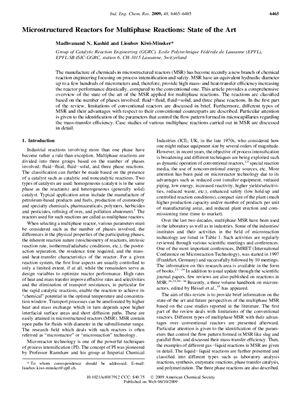The manufacture of chemicals in microstructured reactors (MSR) has
become recently a new branch of chemical reaction engineering
focusing on process intensification and safety. MSR have an
equivalent hydraulic diameter up to a few hundreds of micrometers
and, therefore, provide high mass- and heat-transfer efficiency
increasing the reactor performance drastically, compared to the
conventional one. This article provides a comprehensive overview of
the state of the art of the MSR applied for multiphase reactions.
The reactions are classified based on the number of phases
involved: fluid-fluid, fluid-solid, and three phase reactions. In
the first part of the review, limitations of conventional reactors
are discussed in brief. Furthermore, different types of
MSR and their advantages with respect to their conventional counterparts are described. Particular attention is given to the identification of the parameters that control the flow patte formed in microcapillaries regarding the mass-transfer efficiency. Case studies of various multiphase reactions carried out in MSR are discussed in detail.
Ind. Eng. Chem. Res. 2009, 48, 6465–6485
MSR and their advantages with respect to their conventional counterparts are described. Particular attention is given to the identification of the parameters that control the flow patte formed in microcapillaries regarding the mass-transfer efficiency. Case studies of various multiphase reactions carried out in MSR are discussed in detail.
Ind. Eng. Chem. Res. 2009, 48, 6465–6485

